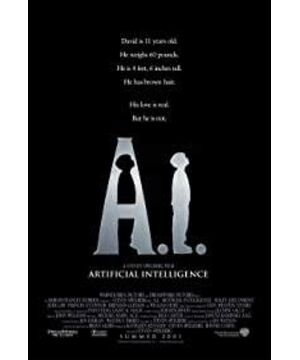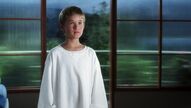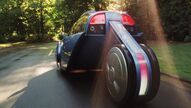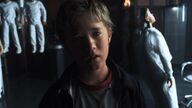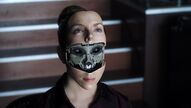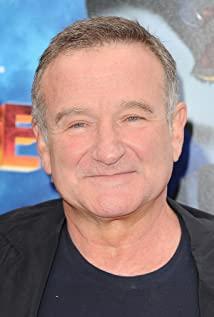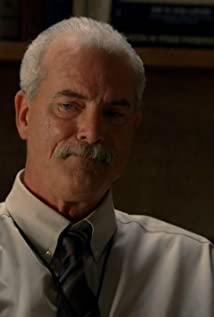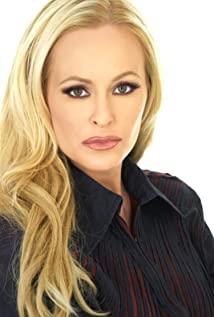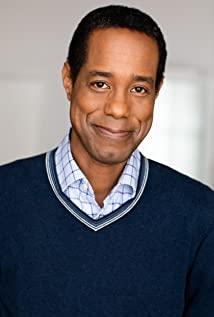Spielberg made a lot of family-centered or child-centered films because his parents were divorced since he was a child.
In these films, the father is often absent. But Spielberg's own father, a sci-fi fan, was the father who showed him the Leonid meteor shower, helped him build a reflecting telescope, and introduced him to space and the universe. "ET" was initially tentatively titled "Looking Up at the Sky".
The science fiction works he has read since childhood are not entirely themes of horror and destruction. Many of them are optimistic. They are not always calculating how far we are from destruction. On the contrary, they are always looking to open up our horizons, Ways to unleash your imagination. It was these stories, along with looking up at the sky, that made Spielberg realize that if I had a chance to make a sci-fi movie, I would have those guys come for peace.
Therefore, in his works, aliens are often friendly, and ET is even a little shy.
"Artificial Intelligence" is a tale of a robot kid looking for love, with many of Spielberg's usual tropes.
music
John Towner Williams, who worked with Steven Spielberg for nearly four decades. Among all the films directed by Spear Cable-Stayed Bridge, only "Purple", "Bridge of Spies" and "Ready Player One" were not scored by John Williams, setting the longest co-operation between director and composer in the history of world film. record.
The "Spielberg Face"
The Spielberg face is often used to express curiosity, fear and submission. Spielberg always brings out the best in actors, and child actors often excel.
David's little actor film never blinks.
Children are an important part of Spielberg's films, and even in films like "Schindler's List", there is a recurring appearance of a little girl in red, which has an important influence on Schindler's final decision; in "Schindler's List" In Minority Report, the child did not appear in front of him, but the male protagonist joined the police force because his son was abducted. At the end, his wife was also pregnant again, and a happy life in the future must include children. Tribe of the Sun tells the story of a British child growing up as Japan rises.
moon
In "ET Alien" the moon became a classic image.
The Moon also appears in many scenes in AI, including the Evil Moon, the hot air balloon used to catch robots, the logo at the Flesh Fair show, and the moon on the children's bed is also the DreamWorks logo.
car rear view mirror
Rearview mirrors are often used to demonstrate important plot points in Spielberg films, such as "Artificial Intelligence" in which David is abandoned in the woods by Monica.
father figure
In this film, Henry and David are not close, and David's initiation is also completed by Monica alone. In the end, the reunion of the two completely excludes Henry. The other father in the film is Professor Hobby, who also eventually loses David again.
circular pattern in the lens
Figures 1-4 are "Sun Tribe", "Duel", "War of the Worlds" and "Jurassic Park" respectively.
Inspiration for "Artificial Intelligence"
This "Artificial Intelligence" joins 2002's "Minority Report" and "Cat and Mouse" as Spielberg's unofficial "Running Man" trilogy.
Based on Brian Aldiss' sci-fi short story "Supertoys Last All Summer Long." This story, first published in the UK edition of Harper's Bazaar in December 1969, tells the story of humanity in the age of intelligent machines and a future of overpopulation, natural birth control, and widespread pain and loneliness. .
Kubrick bought the rights to the novel in 1982, but the technology at the time couldn't support his idea of shooting it. It wasn't until 1993 that Spielberg's "Jurassic Park" was a huge success that Kubrick realized that Spielberg would help him turn the short story into a movie. He discussed the script with Spielberg and commissioned Industrial Light & Magic to design the special effects. However, after Kubrick's unexpected death in 1999, Spielberg announced his own shooting plans in early 2000, and in 2001 brought the unfinished work of his dead friend to the screen. The film applied the latest "real-time 3D computer game engine" system and "On-Set Visualization" technology.
Contrary to my initial impressions (stereotypes?) of Kubrick and Spielberg, those warm parts of "AI", such as the beginning of David's entry into Monica's life and the ending of the aliens trying to help the great The realization of Wei's dream is all from Kubrick's vision; and the dark part of the film comes from Spielberg, who has always promoted family values in the film, such as the Flesh Fair scene of strangling robots.
Throughout the film, the Aldis short story seems to have had far less influence on it than Yeats' poem The Stolen Child by William Butler Yeats. Several images from the poem appear in the film. Such as: Till the moon has taken flight [until the moon has taken flight].
Such as: Come away, O human child! /To the water and the wild /With a faery, hand in hand
Another example: For the world's more full of weeping than you can understand
In addition, the film is also somewhat influenced by PKD's science fiction novel Second Terminator (Second Variety). First published in the journal Space Science Fiction in May 1953. The story takes place after the war between the Soviet Union and the United Nations, when much of the world has been turned into a barren wasteland, and the few remaining soldiers discover self-replicating robots originally built to assassinate Soviet agents. The robots have gained sentience and are starting to confront the two sides that were at the beginning of the war.
Audiences familiar with Astro Boy won't have a hard time finding the similarities between "AI" and Astro Boy. In this manga work by Osamu Tezuka, Dr. Tenma couldn't bear the pain of losing his son, so he created a robot that imitated his son's appearance. He used his son's hair to try to restore his memory and input it into the robot. Dr. Pan gave the blue power supply to Tianma to start the robot. After the robot was activated, Dr. Tianma was so happy that he took him home and planned to spend some time with his "machine son", but it was not long before he realized that the robot was different and could not replace his deceased one. son.
When Kubrick and Spielberg pitched the script to studios, they said the film would be "Blade Runner meets Field of Dreams."
Kubrick features in the film
Kubrick's gaze is usually used to express the insidiousness and cruelty of the characters. In "Artificial Intelligence", David also has a close-up of his head slightly tilted and his eyes looking upwards. Kubrick stared at David to highlight his robot characteristics, which are a little weird and cute.
Other Kubrick tropes include: narration in films; dehumanizing depictions or the dark side of humanity; bathroom scenes; tripartite conflict (David, Monica, and Martin); obsessive heroes; An imaginary world; a journey to freedom and awakening; the use of classical music in the film, Der Rosenkavalier by Richard Strauss.
And the scene of the spinach competition, Henry shouted "stop Dave, please stop!", almost completely copied the scene of HAL and David Bowman at the end of "2001: A Space Odyssey" (2001: A Space Odyssey).
This is "Artificial Intelligence"'s most direct tribute to Kubrick.
View more about A.I. Artificial Intelligence reviews


